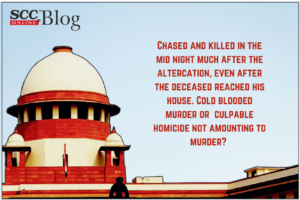Supreme Court: In a case relating to murder versus culpable homicide legal controversy, the Division Bench of M.R. Shah* and B.V. Nagarathna, JJ., held that the Uttaranchal High Court had erred in observing that the case would fall under Fourth exception to Section 300 IPC and had failed to properly appreciate the multiple injuries sustained by the deceased. The Bench expressed,
“…exception Fourth to Section 300 IPC ought not to have been applied by the High Court at all considering the fact that the main second incident had taken place subsequently at 12:00 in the night, much after the first incident of altercation was over in the mehendi ceremony. The impugned judgment and order passed by the High Court is unsustainable both, on facts as well as on law.”
The instant appeal was filed by the State to assail the order of the Uttranchal High Court by which the High Court had held that culpable homicide in the instant case was not murder and consequently converted the sentence from life imprisonment to ten years rigorous imprisonment.
Noticeably, some altercations took place between the deceased Virendra Singh and the accused Sachendra Singh Rawat but due to intervention of the villagers, the matter did not proceed further. Thereafter, at about 12:00 in the night, the accused attacked the deceased by giving him blows by a “Phakadiyat”–a rough piece of wood. The deceased sustained multiple injuries on the head leading to skull fracture which ultimately caused death of the deceased after a few days.
The trial Court held that the culpable homicide was murder and thereby convicted the accused for the offence punishable under Section 302 IPC and imposed the sentence of life imprisonment. However, in appeal the High Court opined that since it was not a cold blooded murder; rather a sudden fight which ensued in the heat of passion between the two; as a result of a sudden quarrel in the marriage ceremony and that the weapon used was “Phakadiyat” which was a rough piece of wood, therefore it could not be said that there was any intention on the part of the accused to kill the deceased. Accordingly, opining that the case would fall under the Fourth exception to Section 300 IPC making it a case of culpable homicide instead of murder, the High Court converted the sentence from life imprisonment to ten years rigorous imprisonment.
Noticeably, the incident took place in two places. The first incident of altercation between the accused and the deceased was at the place of mehendi ceremony, thereafter at about 12:00 in the night, which could be said to be the actual incident which happened when the accused attacked the deceased by “Phakadiyat” and gave several blows to the deceased. The Bench opined,
“The second incident cannot be said to be a result of sudden fight in the heat of passion upon a sudden quarrel. The accused chased the deceased at about 12:00 in the mid night and even after the deceased reached his house, he was beaten by the accused in front of his house which is witnessed by his wife, PW1.”
Therefore, the Bench held that the High Court had erred in observing that the incident had taken place due to a sudden fight in the heat of passion upon a sudden quarrel in the mehendi ceremony. The main cause of death was injuries sustained by the deceased on his head since the accused used the “Phakadiyat” with such a force that it resulted in skull fracture at the frontal wound on the left side; stitched wounds with 34 stitches with left side of the skull. The Bench remarked,
“…having caused the grievous injuries with such a force, how can the accused get the benefit of fourth exception to Section 300 IPC. The case would certainly fall under Clauses Thirdly and/or Fourthly to Section 300 IPC.”
Applying the law as laid down in Virsa Singh v. State of Punjab, AIR 1958 SC 465, that the question is not whether the prisoner intended to inflict a serious injury or a trivial one but whether he intended to inflict the injury that is proved to be present, the Bench held that the High Court had committed a grave error in observing that culpable homicide did not amount to murder, by applying exception Fourth to Section 300 IPC.
In the light of the above, the Bench set aside the impugned order and restored the findings of the Trial Court. The accused was held guilty for the offence under Section 302 IPC and was sentenced to undergo life imprisonment.
[State of Uttarakhand v. Sachendra Singh Rawat, 2022 SCC OnLine SC 146, decided on 04-02-2022]
*Judgment by: Justice M.R. Shah
Appearance by:
For the State: Virendra Rawat, Advocate
For the Respondent: Neha Sharma, Advocate
Kamini Sharma, Editorial Assistant has put this report together

